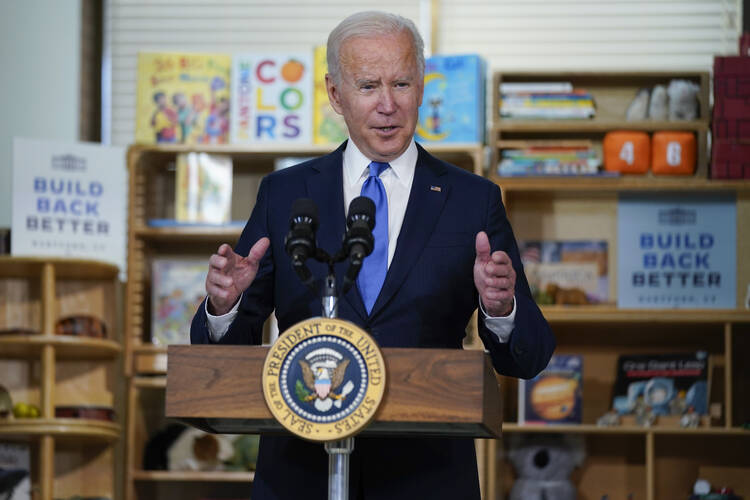[ad_1]
Politics has a funny way of playing. While the political narrative is that America’s bishops oppose President Biden because of his stance on abortion, an opportunity exists for the two actors to work together to enact one of the most socially progressive laws in decades. .
Mr. Biden’s nearly $ 2 trillion “safety net†spending package, which he calls the Build Back Better Act, is now viewed by Congress as a budget reconciliation bill, which requires a simple majority to pass in the Senate and thus escapes an obstruction that would take 60 votes to shut down. If he passes the Senate, it will likely be through a party line vote with all 50 Democrats (and Democrats only) voting for and Vice President Kamala Harris breaking the tie. The passage way is almost as narrow in the House of Representatives, where Democrats have only one 220-212 majority.
The the bill contains many ideas that American bishops have long supported, at least as general principles, including paid family leave, tax credits for working children and families, expanded health care for the poor and the elderly, childcare support and climate change initiatives. (There is also still a chance that it may include protection against deportation and a work permit for some immigrants, although the Senate parliamentarian rejected proposal include this in the reconciliation bill.) Some of these ideas are mentioned in a September 7 Letter to the United States Conference of Catholic Bishops Congress, in which the bishops called on lawmakers “to work on policies that will help those on the margins of society.”
The bill contains many ideas that American bishops have long supported, at least as general principles.
The bill could also be consistent with the church’s pro-life priorities. Senator Joe Manchin, a Democrat from West Virginia and a crucial vote needed for the legislation to pass, said he oppose the measure without the inclusion of the Hyde Amendment, which limits federal funding for abortion in almost all cases. Surprisingly, given his campaign statements on the issue, Mr Biden has publicly stated he would sign the budget package if it includes the Hyde amendment.
Catholic voices on both sides of the political divide should have an interest in working together to push for a comprehensive bill that reflects Catholic priorities. Some Catholics may oppose it because they do not want to give a victory to the Biden administration and the Democrats. But it would reveal that these Catholic voices are guided more by their political alliances than by the social teachings of their faith.
From a Catholic education perspective, legislation needs to be measured by how it supports and protects the most vulnerable among us, not by which party supports it. The budget reconciliation bill not only passes this test, but also addresses an important part of the church’s social justice agenda. Given the very thin margins in both chambers, a unified Catholic voice may be needed to help him cross the finish line.
From a Catholic education perspective, legislation needs to be measured by how it supports and protects the most vulnerable among us, not by which party supports it.
In fact, Catholic organizations, including the USCCB, should pressure Republicans, who are currently unanimously against the bill, to support the measure in an attempt to hold both sides accountable for political positions. the church. Just as bishops call on Democrats on abortion, should they call on Republicans on social justice issues.
This political opportunity reminds us that in politics it is unwise to burn bridges. An opponent on an issue one day can become an ally the next. It also demonstrates that the traditional bipartisan approach of American bishops to public policy is the right one.
Sadly, the recent controversy over whether to prevent President Biden, a Democrat, from receiving Communion has put American bishops in danger of abandoning this bipartisan approach and being labeled, perhaps rightly, as a one-party church.
This perception would weaken the church’s influence on important issues of the day, such as the Biden spending program. Bishops (and Catholics in general) are more effective in influencing the elect through the light of the Gospel than through the militarization of the Eucharist.
This political opportunity reminds us that in politics it is unwise to burn bridges. An opponent on an issue one day can become an ally the next.
Working with President Biden and the Democrats on a bill that reflects Catholic values ​​is a test for bishops and for a politically divided Catholic community. It could, however, unleash the power of a unified church and help correct the perilous path of the bishops to move away from bipartisanship.
The opening is there.
[ad_2]

